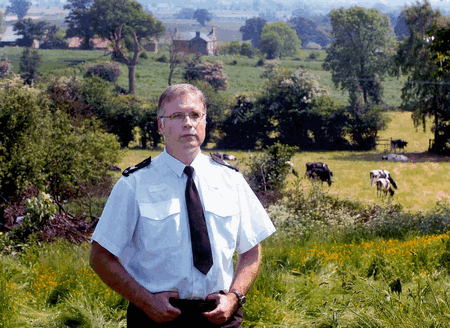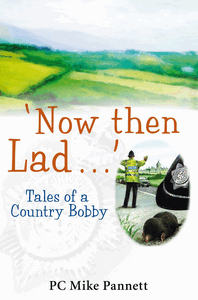Swapping the city beat for life as a rural bobby

I grew up in God’s Own Country. I had the North York Moors to one side, the Wolds to the other, and there towards the setting sun were the Dales. And all I could think about was London. That was where the action was.
Well, I’m exaggerating a bit. As a youngster I loved my home. We lived on an eight-acre smallholding with horses, ponies, a flock of hens, rabbits, geese. You name it, we had it. And we did name some of them – like Oinky Toinky the pig, who spent more time in the house than in the field.
In my spare time I could fly-fish along the Esk, or hang a rod from a boat out of Whitby harbour. Life was good, although not for Oinky. We ate him.
And then I started looking around for a career. I’d been in the scouts, I’d joined the TA and got an appetite for action.
North Yorkshire police seemed the obvious port of call, but they took one look at my great thick specs and shook their heads. “Can’t take on anyone with dodgy eyesight.”
“But our local bobby has ’em,” I said. “Blind as a bat.”
“Aye,” they said, “but he transferred in from elsewhere.”
“You mean there’s forces that’ll take me, specs and all?'”
The recruiting officer pursed his lips. “You could try the Met.”
And so I exchanged the broad acres of the Vale of York for Battersea, where the only time you saw a bit of turned earth was if you went to a funeral. I’d put in a couple of years, learn the trade, then back home.

I stayed 10 years. I loved it down there. I busted drug gangs, confronted knife-wielding madmen, stared down the wrong end of a gun, and mixed with people from all parts of the world. From time to time I went home and dusted down the old fishing rod, but I never gave much thought to moving back. I was serving in the TSG – what the public know as the riot police. For that you have to be seriously fit, busting down doors, breaking up fights, dodging bricks – and worse – at football matches. But when I hit my mid-30s I started feeling my age.
In 1997 I transferred back to North Yorkshire. The dream ticket. Instead of two square miles, I was patrolling 600. And my whole modus operandi changed. First off, the essentials: My pit-stops – places where a friendly farmer would invite me in for a cuppa and a natter. Through them I met gamekeepers, estate managers, even one or two amateur poachers, and found out about the depredations of the pros who travel in from the big cities with dogs, camcorders, and betting slips. You know the type. Nasty people.
I realised that, thinly staffed as we were, we had at our disposal a population of alert and knowledgeable country folk, all of whom had been victims of the things that rarely make the headlines. Trailer theft, sheep rustling, poaching, illegal trapping, siphoning diesel out of storage tanks. The great thing about farmers, I realised, was that they were out there. Year-round. And they noticed things. Some days as I drove around my patch it was as if nothing was happening. Then I’d stop for a coffee. “Aye, you’ve just been over so-and-so, haven’t you?” God knows how, but they knew.
No sooner had I set up my contacts than I started getting tip-offs. “Mike, I saw a van doing the rounds. Five o’clock in t’morning. Not from round here. And three blokes in the front seat? Now, what were they up to, eh?”
I had a think, got together with a bunch of them and set up Countrywatch. A sort of eyes and ears thing. They were dubious at first, but the first time we mounted a night-time operation, parking ourselves at strategic points around a village – bingo. We caught a gang dragging mowers and the like out of sheds, parking them on the grass verge along the main street, then following through in their van to scoop then up. Like bin men, they were. Happy as Larry, until we blocked the exit road and caught them red-handed.
North and south: I’d worked at both ends of the spectrum, but the principles remained the same. In London I had to liaise with the community leaders, be they Yemeni, Polish, Nigerian or Caribbean. In North Yorkshire, whether I was dealing with hunt saboteurs or flooded villagers, enforcing foot-and-mouth regulations or chasing caravan thieves, it was the hardcore local community – farmers, landowners and gamekeepers – who were my biggest allies.

Brought to book
Now Then Lad…, Mike Pannett’s hilarious and informative account of swapping the bright city lights of coppering in London for one on a rural beat in North Yorkshire is published by Constable & Robinson, priced £7.99. Mike, who starred in the 2005 BBC series Country Cops, served nearly 20 years in the police, during which time he became one of the most highly commended officers, for intelligence gathering, drug seizures, and bravery.
Win a copy
Farmers Weekly has five copies of this super book to give away. To be entered for a draw, just send your name, address and daytime phone number to Farmlife, Farmers Weekly, Quadrant House, The Quadrant, Sutton, Surrey, SM2 5AS in an envelope or postcard clearly marked Now Then Lad… Or you can email them to fwfarmlife@rbi.co.uk
